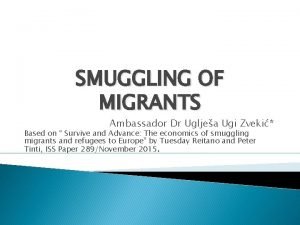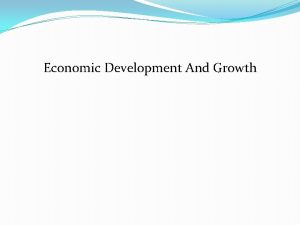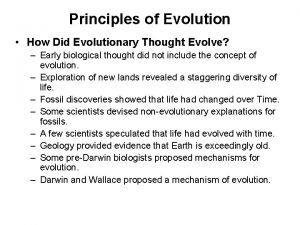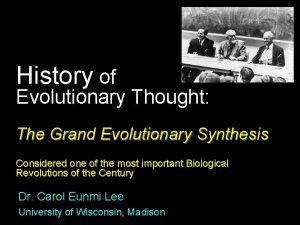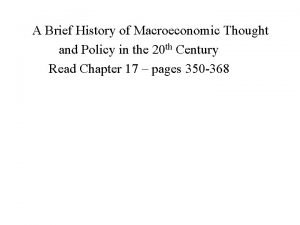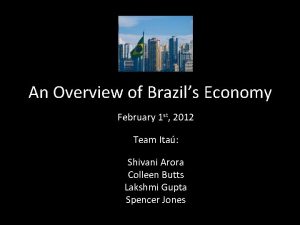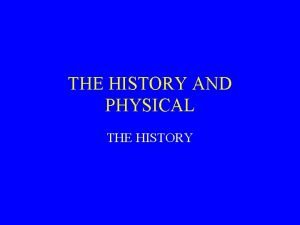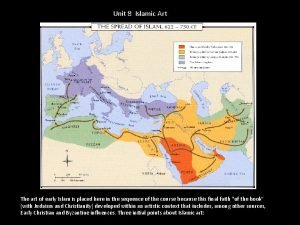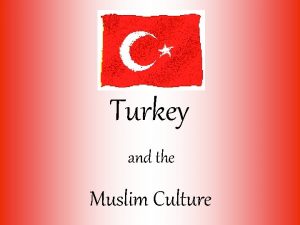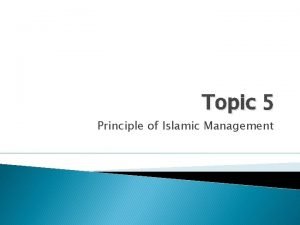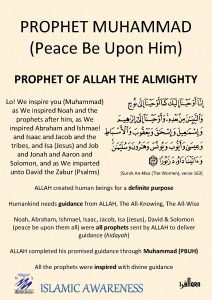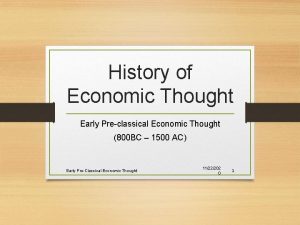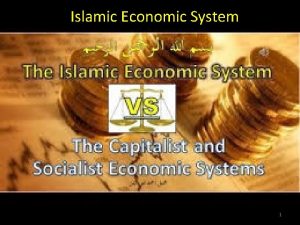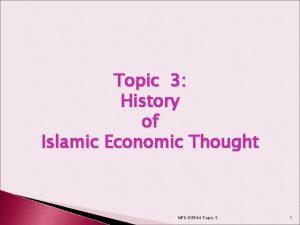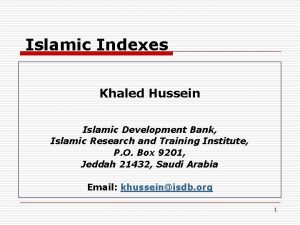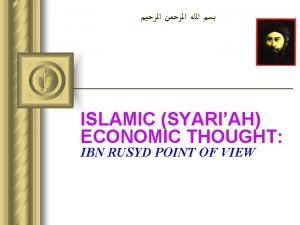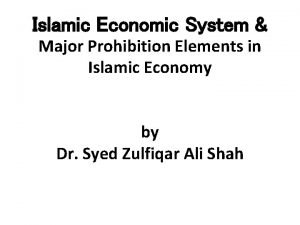History of Islamic Economic Thought Dr Ugi Suharto



















- Slides: 19

History of Islamic Economic Thought Dr. Ugi Suharto

Outline of Islamic History • History of Islam started with the birth of Prophet • • Muhammad (pbuh) at Mecca in 570 He received his first Revelation when he was at 40. Migrated to Madinah in 623 Passed away in 11/632 and already established Muslim state in the whole of Arab peninsular. His economic policy?

Four Guided Caliphs 1. 2. 3. 4. • • Abu Bakr (d. 13/634) – Economic Policy? Umar b. al-Khattab (d. 23/634) Uthman b. Affan (d. 35/656) Ali b. Abi Talib (d. 40/661) The rule of the four guided caliphs was about 30 years. After this period, the history of Islamic civilization is ruled by the dynastic caliphates.

The Journey of Islamic Empire • The Umayyad Caliphate (Damascus Syria : • • 40/661 to 132/750). The most famous figures: Adbul Malik b. Marwan (65 -86/685 -705) and Umar b. Abdul Aziz (99 -101/717 -720) Abbasids Caliphate in Baghdad (132 -656/7501258). World center of knowledge, science, and civilization. Mongols attack and the fall of Baghdad in 656/1258

Five centers of Islamic world: • Ottomans: capture of Constantinople in 857/1453 • Mamluks in Egypt, Palestine, and Syria which survived Mongol invasion. Incorporated into Ottoman empire in 922 -3/1516 -7 • Safavids in Iran: beginning of the XI/17 th century. • Mughal in India: (932 -1274/1526 -1858) and finally overthrown by the British in 1274/1858 • From the X/16 th century onwards, Islamic world was in retreat, and • falling under the domination of a Europe which was expanding at both ends. The process began with the reconquest of Russia and Spain. Western Europeans circumnavigated the African continent and began to establish a growing hegemony in South-East, southern and ultimately South-West Asia. Islamic world was caught between Russia from the north and the Western Europe from the south. This situation was for a while delayed by the military of the Ottoman, Persian, and Mughal empires; but in time they were unable to resist the European advance.

“Great-Gap” Theory • Joseph Alois Schumpeter (1883 -1950) authored History of Economic Analysis, edited after his death by his wife and published in 1954, argued that ‘economic analysis begins only with the Greeks’, not to be reestablished until the Scholastics emerged with St Thomas Aquinas; • the many ‘blank’ centuries within that span represent his ‘Great-Gap Theory’ • The book attempts to cover “the whole span of more than • 2000 years from the ‘beginning’ to about twenty years after publication of the Wealth of Nations. “So far as our subject is concerned we may safely leap over 500 years to the epoch of St Thomas Aquinas (1225 -1274) whose Summa Theologica

GREAT GAP TRADITIONS 1. The implication here is that for more than five hundred 2. 3. 4. 5. 6. years prior to the writings of the Scholastics, nothing of any significance to economics was said or written anywhere else –Spengler and Allen, Essays in Economic Thought: Aristotle to Marshall (1960) Eric Roll, A History of Economic Thought (1965) Ingrid H. Rima, Development of Economic Analysis (1967 & 1991) Henry Spiegel, The Growth of Economic Thought (1971 & 1983) Robert Ekelund and Robert Hebert, A History of Economic Theory and Method (1975 & 1990) Harry Landreth and David Colander, History of Economic Theory (1989)

Criticisms of the Great-Gap Theory • “No historical student of the culture of Western Europe can never reconstruct for • • • himself the intellectual values of the later Middle Ages unless he possesses a vivid awareness of Islam looming in the background. ” (Bulter, p. 63) “Without the influence of Arabian Peripateticism, theology of Aquinas is as unthinkable as his philosophy. ” (Harris, p. 40) “The fact that Aquinas derived ideas and stimulus from a variety of sources i. e; Aristotle and about Islamic and Jewish philosophy, as also of course about previous Christian thought” (Copelston, p. 181) “In the 12 th and 13 th centuries, Arabic philosophical writings exerted a significant stimulative influence on the great synthesis of Christian Aristotalianism by St. Albert the Great and St. Thomas Aquinas…relatively continuous” (Rescher, p. 156 -7 ) “The Arab has left his intellectual impress on Europe, as, before long, Christendom will have to confess; ” (Draper, vol. 2, p. 42) “…since al-Ghazali placed science, philosophy, and reason in position inferior to religion and theology, the Scholastics accepted his views, which became characteristic of most medieval philosophy. St Thomas Aquinas, however, was somewhat of an exception, for he would quote Avicenna, Averrous, Al-Ghazali, and others” (Myers, 1964, p. 39 -40) Al-Ghazali’s work “was paralleled by Thomas Aquinas in the discourse on Christian doctrine and in other portions of the Summa Theologica” (Jurji, 1979, 313)

Some Authors/Thinkers of Economics and Economy from • Islamic perspective • Islamic vision • Islamic worldview

Blank History of Economic Thought ? Abu Yusuf Qudamah b. Ja’far 672 H 157 H 774 1274 Abu ‘Ubayd Al-Awza’i (d. 157) Al-Shayzari Al-Ghazali Nasiruddin Al-Tusi (d. 672)

Historical Foundation • The first phase: up to 450/1058 • The second phase: 450 -850/1058 -1446 • The third phase: 850 -1350/1446 -1932 • The great-gap falls on the first and the second • phase. Among the scholars of the first phase are Abu Yusuf (d. 182/798), Muhammad b. al-Hasan (d. 189/804), Abu ‘Ubayd (d. 224/838), al-Muhasibi (d. 243/859), Junaid al-Baghdadi (d. 297/910), Ibn Miskawaih (d. 421/1030), al-Mawardi (d. 450/1058),

From 8 th – 9 th Century • Zaid b. ‘Ali (d. 80/738) permitted the sale of a commodity on credit at a • • • price higher than its cash price. The case is different from that of money loans. Abu Hanifah (d. 150/767), He found a lot of confusion surrounding the contract of salam leading to disputes. Al-Awza’i (d. 157/774), He tried to eliminate them by specifying what must be known and stated clearly in the contract, such as the commodity, its kind, quality and quantity, and the date and place of delivery, including that the commodity be available in the market. Malik b. Anas (d. 179/796). Malik’s method which is relevant for economics is that on maslahah (utility, whether individual or social) Abu Yusuf (d. 182/798), The author of Kitab al-Kharaj. The main strength of Abu Yusuf’s thiking lies in the area of Public Finance Al-Shaibani (d. 189/804), The author of Kitab al-Iktisab fi al-Rizq al. Mustatob (Book on Earning a Clean living). He describes a good Muslim’s consumption behaviour and emphasises the desirability of charitable giving on the one hand the undesirability of begging on the other hand. Ahmad b. Hanbal (d. 241/855). He decried purchase from a seller who lowered the price of a commodity in order to dissuade people from buying the same from his neighbour (competitor).

From th 10 – th 11 Century • Qudamah b. Ja’far (d. 320/932), Author of another Kitab al-Kharaj. There is • • • an article by Cengiz Kallek entitled “Qudamah Ibn Ja’far on Certain Aspects of Political Economy” (1998) Al-Dawudi (d. 402/1012), The author of another Kitab al-Amwal. His book is in fact like another Kitab al-Kharaj. Al-Mawardi (d. 450/1058), The author of al-Ahkam al-Sultaniyyah, on the rules of governance and administrative procedures. Ibn Hazm (d. 456/1064), He is from al-Andalus. He has a view on the rights of the have-nots in the wealth of the haves. He is the only one among the great jurists to have prohibited renting of agricultural land. Nizam al-Mulk (d. 485/1093), Prime minister of Saljuq dynasty for 30 years. The author of Siyasat Nameh, on government administration. He had a firsthand knowledge of all administrative affairs especially those relating to the land. His reform on iqta’ system and the land relations presented entirely different from that of European feudalism.

From 12 th – 13 th Century • Al-Ghazali (d. 505/1111), Economic thinking of the author of Ihya’ ‘Ulum al. Din (Revival of Religious Sciences). He discusses the disadvantages of • • barter and the importance of money and its function as medium of exchange, standard of value, and store of value. Al-Kasani (d. 578/1182), adai’ al-Sanai’, analysed some economic issues, such as distribution of profits and liabilities to losses in mudarabah. Al-Shaizari (d. 589/1193), The author of Nihayat al-Rutbah fi Talab al. Hisbah, The state was duty bound to eliminate hoarding, monopoly, speculation, gambling practices, riba, adulteration and fraud, and transactions involving avoidable uncertainty from the market. Fakhruddin al-Razi (d. 606/1210), The author of al-Tafsir al-Kabir, His discussion on the prohibition of riba is rational and analytical. Nasiruddin al-Tusi (d. 672/1274), He is credited with a treatise on public finance. The treatise also discusses the economic behaviour of the individual. He emphasised savings and advises against expenditure on jewellery and uncultivable land. His death falls in the same year as the death of Thomas Aquinas whom Schumpeter considered the beginning of economic thought in the West after having a blank history of 500 years.

Filling the 500 year Gap Zaid b. Ali (738) Abu Hanifah (767) Al-Awza’i (774) Malik b. Anas (796) Abu Yusuf (798) Al-Muhasibi (859) Junaid Baghdadi (910) Qudamah b. Ja’far (932) Al-dawudi (1012) Al-Ghazali (1111) Al-Kasani (1182) Al-Syaizari (1193) Al-razi (1210) Al-Tusi (1274) Al-Syaibani (804) Ibn Maskawayh (1030) Yahya b. Adam (818) Al-Syafi’i (820) Abu ‘Ubayd (838) Ibn Hanbal (855) Al-Mawardi (1058) Ibn Hazm (1064) Al-Sarakhsi (1090) Nizamul Mulk (1093)

Other Figures • Ibn Taymiyyah (d. 728/1328) • Ibn al-Ukhuwwah (d. 729/1329) • Ibn al-Qayyim (d. 751/1350) • Al-Shatibi (d. 790/1388) • Ibn Khaldun (d. 808/1404) • Al-Maqrizi (d. 845/1441) • Shah Waliullah (1176/1762) • Etc.

Some of the Identified Issues • Redistribution of income and • • wealth Land agriculture Industry Trade Labour and social security Prohibited economic practices Interest Hoarding Fraudulent and speculative business • • • Financial System of Islam Taxation Public borrowing Public expenditure Nature and function of money Market and pricing Production activities Treatment of wealth and poverty Al-hisbah and state’s role in economy Stages of socio-economic development Etc.

Examples of General Sources • Tafsir Literature • Hadith Compediums • Adab Literature • History and • • • and its commentaries Fiqh and Usul Fiqh Literature Kalam Literature Philosophy Literature Sufi Literature • • Geography Works that resist classifications Some special sources to the Ottoman period Literature on politics and administration

Examples of Special Sources • • Al-Hisbah Literature Al-Kharaj Literature Al-Amwal Literature Al-Kasb Literature Works on al-Nuqud Literature on al-Tijarah Single Independent (or Unique) Works Etc.
 Ugi suharto
Ugi suharto Timang iku kagawe saka
Timang iku kagawe saka Ugi zvekic
Ugi zvekic Islamic schools of thought map
Islamic schools of thought map Complete vs incomplete thinking
Complete vs incomplete thinking 3 forces behind management thought
3 forces behind management thought Economic growth vs economic development
Economic growth vs economic development Economic development vs economic growth
Economic development vs economic growth Economic systems lesson 2 our economic choices
Economic systems lesson 2 our economic choices History of evolutionary thought
History of evolutionary thought History of evolutionary thought
History of evolutionary thought History of macroeconomic thought
History of macroeconomic thought History of management thought
History of management thought Brazil economic history timeline
Brazil economic history timeline Also history physical
Also history physical What is islamic art
What is islamic art Is turkey part of europe or asia
Is turkey part of europe or asia Principles of islamic management
Principles of islamic management Islamic interbank money market
Islamic interbank money market Islamic prophets family tree
Islamic prophets family tree


